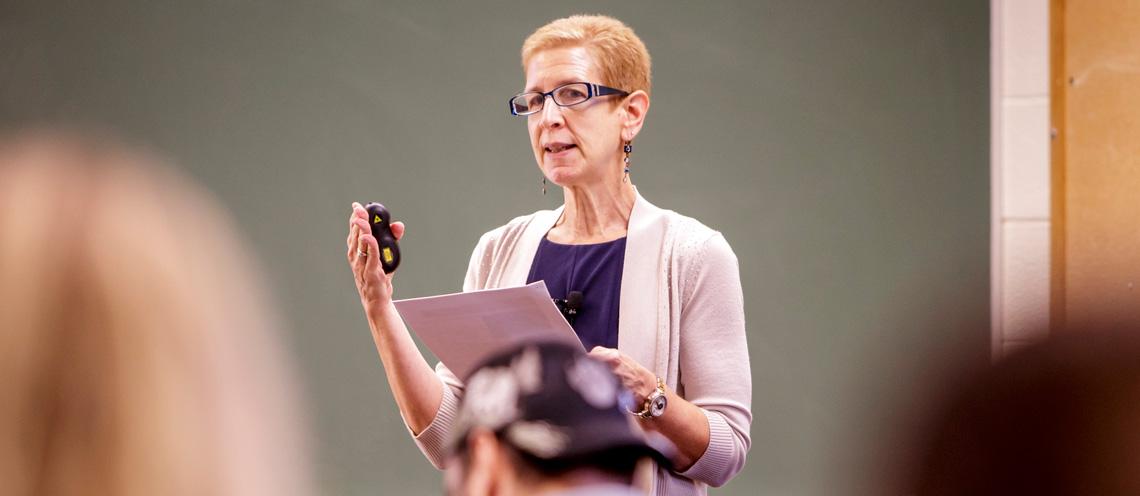
Dr. Margi Gilmour: 2017 Regents Distinguished Teaching Award Recipient
Wednesday, December 13, 2017
It’s easy to see why Dr. Margi Gilmour received the 2017 Regents Distinguished Teaching Award. Watching her in the classroom or talking with her, Gilmour’s passion for teaching comes shining through.
“The thing I love the most about teaching is when you see that ‘ah ha’ moment in your students,” explains Gilmour. “Either when you’re in class and you see them nodding and smiling or on clinics the first time they look into the back of an eye and they really see a good view of the fundus on their own and they just realize, ‘oh my gosh, this is every bit as cool as you have said Dr. Gilmour.’”
Gilmour, professor of ophthalmology and interim associate dean for academic affairs, has been teaching for 16 years at Oklahoma State University’s Center for Veterinary Health Sciences.
“Receiving the Regents Distinguished Teaching Award means the world to me because teaching has been important to me really since I was in grade school. So it’s a big honor. It validates the love that I’ve had all these years.”
She chose ophthalmology as her discipline in veterinary medicine for a couple of reasons.
“I realized being on emergency that the cases that really excited me were the ophthalmology cases. And it wasn’t that I knew ophthalmology very well, but when I would look into an eye, it was just fascinating to me. I also realized that as an ophthalmologist we can do medicine and surgery. So you don’t have to give up one for the other when you specialize. Also it (ophthalmology) goes across all species. I can do wildlife, large animal and small animal.”
Gilmour considers her success stories to be those students who have graduated and contact her as practicing veterinarians.
“They will email me or call me or sometimes even send a letter saying, ‘Dr. Gilmour, I now realize how important everything was that you taught me or thank you so much. Now I realize that everything I learned is really what I need in practice. I can use the tools you gave me and do a good job and make a difference.’”
Gilmour has spent the last year as the interim associate dean for academic affairs and feels that role is connected to her teaching position.
“First of all, I feel like I can watch over all the students now, not just my own students in my class or on my rotation, and be sure that they’re getting everything they need. And in the end, what is really going to be critical is that they are competent and confident veterinarians. And the other aspect, which I think is very important, is I can also play a role in faculty development in education and try to offer more and more opportunities for our faculty to become better educators and just find that love of teaching.”
And to younger faculty members just beginning their journey as an educator, Dr. Gilmour offers this advice.
“When it comes to teaching, number one is you don’t start out as an excellent teacher. It’s a growth. It’s something that you work on and you progress towards. It’s keeping current on some of the new teaching philosophies and things that will engage our students and increase their retention. I think when you learn those aspects, just like we all learn veterinary medicine, it makes teaching a dynamic type of activity and not just ‘oh, I know this topic. I’m just going to go recite this material.’ You actually find the fun and the joy in teaching because it can be dynamic; you can do new things in your classes every year. You don’t have to be perfect from the outset, just make those little changes as you go along. I think your teaching career will not only be fun but it will stay stimulating for you no matter how long you continue to teach. Even if it’s 30 years, it will still be fun for you.
“I would like to thank everybody who has supported me in my 16 years here—for the excellent teachers who encouraged me and also people on campus. The Institute for Teaching and Learning Excellence on campus has given me great ideas that have allowed me to expand my teaching. I’m just really thankful to be at Oklahoma State and our program at the Center for Veterinary Health Sciences. We value teaching and that to me is critical. I wouldn’t want to be at a college where teaching was not considered a high priority, and it really is here.”
Gilmour earned her DVM degree from Michigan State University in 1986. She is a board certified ophthalmologist and a diplomate in the American College of Veterinary Ophthalmologists. Her faculty appointment includes treating patients of all species with ophthalmic disease at the Veterinary Medical Hospital, providing consultations for referring veterinarians in the quad-state region, teaching ophthalmology to veterinary students in years two, three and four, providing continuing education to veterinarians, and conducting research pertaining to veterinary ophthalmology and veterinary medical education.
